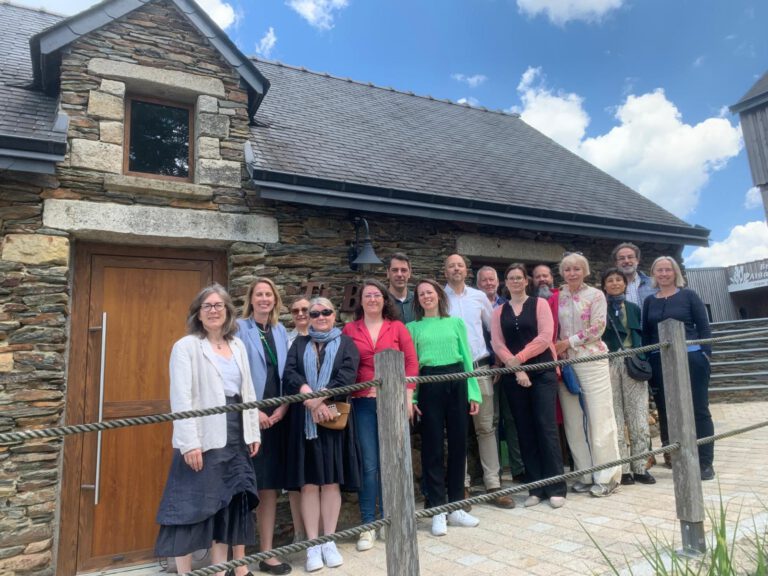
The PROTEUS consortium gathered in Bréhan, France, on 21–22 May 2025 for its third General Assembly. Hosted by Olmix Group, the meeting brought together all project partners to review progress, align on next steps, and emphasise important themes essential to the success of Europe’s flagship seaweed biorefinery project.
Key Highlights:
- RRI Workshop: Day 1 featured an interactive workshop on Responsible Research and Innovation (RRI), exploring ethical, societal, and sustainability dimensions of the project.
- Stakeholder Mapping Workshop: Day 2 focused on identifying key actors across the seaweed value chain, setting the stage for effective outreach and exploitation.
- Technical Progress: All partners reported substantial advancements, reinforcing PROTEUS’s path toward a fully integrated, sustainable biorefinery for brown seaweeds.
Brittany, France – 23 May 2025
The PROTEUS consortium, aiming to establish the world’s first of its kind industrial-scale biorefinery for brown seaweeds, convened its third General Assembly and project meeting at Breizh Algae School in Bréhan, Brittany on 21–22 May 2025. Hosted by consortium partner Olmix Group, this gathering summarised the project’s technical progress, advanced the strong collaboration, and hosted two important workshops that highlight the project’s commitment to innovation and responsibility.
Highlighting Responsibility and Engagement
On the first day, the consortium held a dedicated Responsible Research and Innovation (RRI) workshop, led by NORSUS, which explored the social, ethical, and sustainability dimensions of the project. The session fostered reflections on stakeholder expectations, inclusive research processes, and long-term impacts, reinforcing the project’s alignment with European values and climate goals.
Mapping the Future
The second day featured an interactive stakeholder mapping workshop led by Steinbeis Europa Zentrum, aimed at identifying and categorising key actors across the seaweed value chain. This strategic exercise laid the groundwork for future engagement and exploitation activities, ensuring that the project’s outputs are tailored to real-world needs and opportunities.
“Bringing the PROTEUS consortium together in Brittany allowed us not only to align on technical progress, but also to deepen our shared commitment to sustainable innovation,” said Dr. Ilka Czech, Project Coordinator from Alginor ASA. “The stakeholder and RRI workshops were powerful reminders that building a successful biorefinery goes hand in hand with engaging society and shaping a responsible, future-proof algae industry.”
Technical Progress and Planning
Throughout the meeting, partners presented their progress, including advancements in construction, technology development, market analysis, and policy alignment. The event also featured a guided tour of Olmix Group’s local algae-based innovation facilities, exemplifying synergies between research and industrial application.
About PROTEUS
The PROTEUS project, supported by the Circular Bio-based Joint Undertaking (CBE JU) and its members, aims to build the world’s first industrial scale biorefinery dedicated to unlocking the full potential of Europe’s brown macroalgae. The consortium, coordinated by Alginor ASA, includes eleven international partners including Vaessen-Schoemaker (food), OLMIX (animal feed), ESSITY (personal care), and BORREGAARD (industrial applications), alongside research and sustainability experts such as IMR, NORSUS, CLIC and Steinbeis Innovation, and two affiliated entities, Alginor Biorefinery and Hypomar, linked to Alginor ASA. By developing chemical-free harvesting and extraction techniques, PROTEUS seeks to transform 100% of this renewable resource into products for food, animal feed, personal care, and industrial applications. With a €14.4 million budget over four years, including a €9.6 million grant from the CBE JU, the biorefinery aims to produce over 5,000 tonnes of high-value ingredients annually. PROTEUS leverages advanced processes and technologies to support the transition to a circular bioeconomy, creating new opportunities within the bio-based industry.
About CBE JU
The project is supported by the Circular Bio-based Europe Joint Undertaking (CBE JU) and its members. The CBE JU is a €2 billion partnership between the European Union and the Bio-based Industries Consortium, funding projects to advance circular bio-based industries in Europe.
CONTACT
Project Coordinator: Ilka Czech and Bjarte Langhelle, Alginor ASA
ilka@alginor.no, bjarte@alginor.no
Main Press Contact: Alparslan Akkus, Steinbeis Europa Zentrum
alparslan.akkus@steinbeis-europa.de